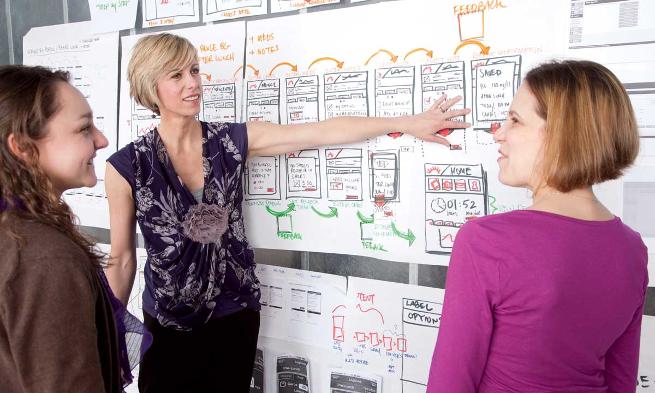A world-changing tool for type 2 diabetics
Being the Change
Knowledge and self-management can be key in controlling disease
By Jeffrey Cretz ('03)
According to the Centers for Disease Control and Prevention, 8.3 percent of Americans have diabetes. Up to 95 percent of the cases are type 2, adult-onset diabetes, which usually begins as insulin resistance, a disorder in which cells do not properly use insulin.
What if the more than 26 million Americans with type 2 diabetes could improve their overall health by using a tool and support system to manage their disease? What if type 2 diabetics were able to receive real-time clinically based feedback and virtual coaching on effective lifestyle and medication adjustments? And what if the information they entered into their compatible device could be sent to health care professionals without a trip to the doctor's office?
Endocrinologist and JMU biology major Suzanne Sysko Clough ('93), M.D., is making it possible.
Clough co-founded WellDoc® with her brother and currently serves as the company's chief medical officer. In 2010, WellDoc received U.S. Food and Drug Administration approval to market its flagship Diabetes Manager® System as a class II medical device to health care providers and their adult type 2 diabetes patients. DiabetesManager is the first medical device cleared by the FDA for real-time feedback.
In a major milestone, WellDoc's DiabetesManager was the subject of a landmark clinical trial, published in the September 2011 issue of Diabetes Care, the preeminent diabetes-focused scientific journal published by the American Diabetes Association. The trial showed that diabetes patients using the DiabetesManager system plus their usual care had statistically and clinically better outcomes versus those patients treated with usual care alone. The main goal of the study was to compare changes in hemoglobin A1C, which is a measure of long-term blood sugar control. The ADA recommends an A1C of less than 7 percent. Most Americans with type 2 diabetes have an average level of more than 9 percent.
"The DiabetesManager System supports medication adherence and securely provides for the capture, storage and real-time transmission of blood glucose data and other diabetes self-management information," explains Clough. "The information is then analyzed by the company's proprietary Automated Expert Analytics System, which identifies trends and delivers relevant educational and behavioral patient coaching and provider decision support, thus enabling effective lifestyle and medication adjustments."
According to Richard Bergenstal, ADA president and executive director of the International Diabetes Center at Park Nicollet, "With type 2 diabetes reaching epidemic rates, health care providers need new tools to more efficiently engage their patients between and during office visits."
WellDoc's System addresses this need, and it can be done from the convenience of a mobile phone. Bloomberg BusinessWeek listed DiabetesManager as one of 15 new mobile health solutions to watch.
The idea for DiabetesManager came to Clough, as with most good inventions, out of necessity. Typical treatments were not working for some of Clough's patients. "Our health care system is not set up to give patients the time they need to make sure they have all the knowledge and self-management skills to gain control over their disease when they walk out of a physician's office," she explains.
Clough decided to make a difference by offering mobility as a tool—giving patients access to the right information at the right time. "Type 2 diabetes can be both prevented by and managed better by incorporating lifestyle changes like exercise and proper nutrition," says Clough, who has a passion for both clinical medicine and fitness.
DiabetesManager continues to gain recognition. It was highlighted as one of the standout mobile health systems for the management of chronic conditions in the 2011 Scientific American article, "World Changing Ideas: 10 new technologies that will make a difference."
Board certified in internal medicine and endocrinology, Clough says, "I knew I wanted to be a physician, so studying biology at JMU made the most sense." After her Madison Experience, Clough attended the University of Maryland's School of Medicine. She completed her residency program and endocrinology fellowship at the University of Maryland Medical Systems.
Among Clough's favorite Madison memories are trips with friends along Skyline Drive and the trailers where her biology classes were held while the integrated science and technology buildings were under construction. Having classes in more confined areas with smaller class sizes was perfect for an intense learning environment she says. "If you were not in class, it was noticed. If you had a puzzled look on your face, it was addressed. JMU professors engaged with students."
Clough and her husband, Jack, and their two children, Jackson and Cecelia live in Wilmington, Del. Clough's brother, her parents and her in-laws all live within 30 minutes. "I'm a homebody. It's a dream come true to be able to be so close, literally and figuratively, to my family."
